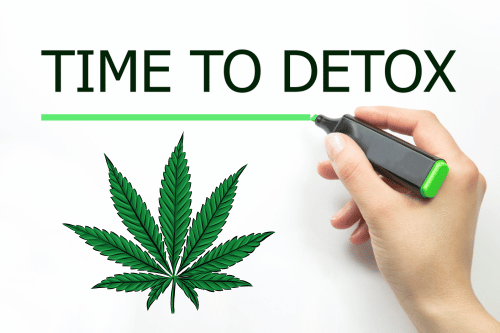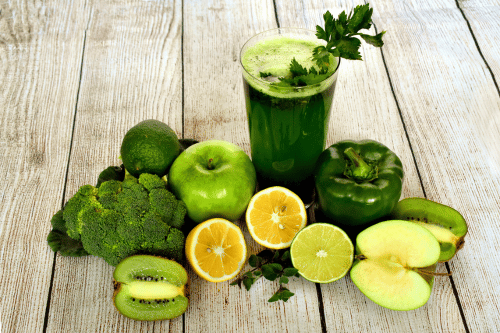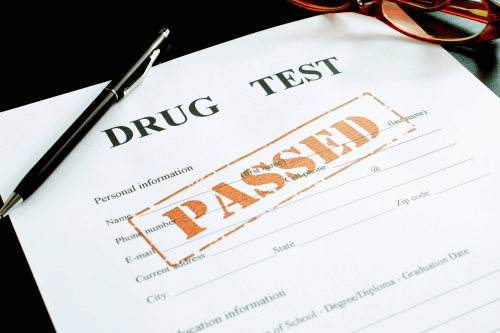How To Detox Your Body From THC
Detoxifying your body from THC, the active compound found in marijuana, is essential for various reasons ranging from passing a drug test to overcoming marijuana addiction. The process of a weed detox can be challenging and requires a strategic approach, including lifestyle changes, dietary adjustments, and sometimes, the use of specialized products.
This comprehensive guide will walk you through everything you need to know about how to detox your body from thc ensuring you have all the necessary information to undergo a successful detoxification process.

Understanding THC and Its Effects
What is THC?
THC, or tetrahydrocannabinol, is the primary psychoactive component in cannabis, responsible for the “high” that users experience. When consumed, THC binds to cannabinoid receptors in the brain, particularly the CB1 receptors, which are part of the endo-cannabinoid system. This interaction affects the release of various neurotransmitters, which in turn influences numerous physiological processes including mood, memory, pain sensation, and appetite.
Chemical Structure and Properties
THC has a chemical structure that allows it to dissolve in lipids (fats), making it lipophilic. This property means that THC is stored in the body’s fat cells, which leads to its gradual release back into the bloodstream over time. Because of this, the elimination of THC from the body is a slow process, which is an important consideration during a marijuana detox.
Mechanism of Action
When THC enters the brain, it activates the CB1 receptors. These receptors are part of the endocannabinoid system, which plays a role in regulating a variety of physiological and cognitive processes. Activation of these receptors leads to the release of dopamine, a neurotransmitter associated with pleasure and reward, contributing to the euphoric feelings or “high” that users experience.
The effects of THC are dose-dependent and can vary significantly between individuals. Factors such as the method of consumption (smoking, vaping, edibles), dosage, and the user’s individual physiology and tolerance levels can all influence the intensity and duration of the effects.
How THC Affects the Body
THC’s effects on the body can vary widely, impacting cognitive function, motor skills, and overall mental health. Upon consumption, THC induces a range of psychoactive effects including euphoria, relaxation, altered sensory perception, and increased appetite. However, these effects can be accompanied by adverse reactions such as paranoia, anxiety, and dizziness, especially in higher doses or among first-time users.
Frequent and prolonged use of marijuana can lead to more persistent changes in brain function. Regular users may develop tolerance, necessitating higher doses to achieve the same effects. Moreover, the body’s adaptation to the constant presence of THC can lead to cannabis withdrawal symptoms upon cessation. These withdrawal symptoms may include:
- Anxiety: Increased feelings of nervousness and tension.
- Irritability: Heightened sensitivity and easily provoked anger.
- Insomnia: Difficulty falling or staying asleep, often accompanied by vivid dreams or nightmares.
- Loss of appetite: Reduced desire to eat, which can lead to weight loss.
-
Depression: Feelings of sadness, hopelessness, and a lack of interest in previously enjoyed activities.

The Importance of Detoxing from THC
Why Detox from THC?
Detoxification from THC is a crucial step for individuals facing an upcoming drug test, particularly in the context of employment applications or legal proceedings. Clearing the body of THC metabolites becomes a necessity to ensure a negative test result. However, the benefits of detoxification extend beyond merely passing a drug test.
For individuals struggling with marijuana addiction, detoxification can be a critical first step in the recovery process. The process helps to alleviate and manage withdrawal symptoms, which can range from irritability and insomnia to anxiety and decreased appetite. By addressing these symptoms through detoxification, individuals can more comfortably and effectively embark on the path towards overcoming addiction.
Moreover, detoxification can significantly contribute to improving overall health and well-being. THC metabolites can linger in the body for extended periods, affecting cognitive function, energy levels, and even mood. Clearing these metabolites can lead to enhanced mental clarity, increased energy, and a more positive outlook.
The THC Detox Process Explained
The detoxification process revolves around the removal of THC metabolites from the body. These metabolites are the byproducts that THC breaks down into, and they are detectable in drug tests long after the initial effects of marijuana have subsided. The duration of the detoxification process can vary depending on several factors, including the frequency and amount of marijuana used, individual metabolism, and body fat percentage.
Various thc detox methods exist, each with its own advantages and limitations. Natural detoxification involves abstaining from marijuana use and adopting a healthy lifestyle, including regular exercise, a balanced diet, and adequate hydration. This method can take longer, but it is a sustainable approach that promotes overall well-being.
Alternatively, detoxification products, such as detox drinks, pills, and kits, are available in the market. These products claim to accelerate the removal of THC metabolites, but their effectiveness and safety should be carefully considered. It is essential to consult with healthcare professionals or addiction specialists before using any detoxification products.
Preparing for the Detox Process
Assess Your Situation
Before starting a THC detox, it’s crucial to assess your current marijuana usage. To do this effectively, take a detailed inventory of your habits. Begin by determining how frequently you consume marijuana: is it daily, multiple times a day, weekly, or less often? Understanding your frequency of use will help you anticipate the intensity of your detox symptoms and plan accordingly.
Additionally, consider the amount of marijuana you typically consume during each session. Do you usually smoke a small amount, or do you tend to indulge in larger quantities? This information will provide valuable insights into the potential duration of your detox journey. By accurately evaluating your current level of marijuana use, you can create a more personalized and successful detox plan.
Set Clear Goals
To set yourself up for success, it’s essential to establish clear, well-defined goals for your THC detox. These goals will serve as your roadmap, guiding you through the challenges and keeping you motivated throughout the process. Your reasons for detoxing could vary widely, ranging from passing an upcoming drug test, overcoming marijuana addiction, or simply improving your overall health and well-being.
Reflect on your specific motivations and articulate them clearly. Do you want to regain control over your life, improve your mental clarity, enhance your physical health, or mend relationships that may have been strained by your marijuana use?
Clearly defining your goals will help you make informed decisions during the detox process and stay focused on your desired outcomes. Remember, setting achievable milestones and celebrating your progress along the way will reinforce your commitment and ensure a successful detox journey.

Methods to Detox from THC
Natural Detoxification
Natural detoxification harnesses the inherent mechanisms of the body to gradually eliminate THC. While this approach might take longer than other methods, it prioritizes gentle, sustainable cleansing through holistic lifestyle adjustments.
Hydration: The Elixir of Detoxification
Water serves as a fundamental pillar of natural detoxification. By maintaining optimal hydration levels, you facilitate the body’s ability to flush out THC metabolites through urine and sweat. Aim to consume a minimum of 8-10 glasses of water per day, and consider incorporating hydrating beverages like herbal teas and infused water to enhance your intake.
Exercise: Fueling the Body’s Cleansing Fire
Regular physical activity plays a pivotal role in natural detoxification by promoting fat metabolism, thereby releasing stored THC metabolites into the bloodstream for elimination. Engaging in aerobic exercises such as running, swimming, or cycling, as well as incorporating strength training, can significantly accelerate the body’s natural cleansing process.
Diet: Nourishing the Body’s Detoxification Systems
A well-balanced diet provides essential nutrients that support the liver and kidneys, the primary organs responsible for detoxification. Emphasizing fruits, vegetables, and lean proteins not only fuels your body but also supplies antioxidants that combat oxidative stress induced by THC. Additionally, fiber-rich foods aid in digestion and promote the removal of waste products.
Sleep: The Restorative Power of Slumber
Quality sleep is paramount for effective detoxification. During sleep, the body undergoes vital repair and regeneration processes, facilitating the elimination of toxins like THC. Ensure you prioritize 7-9 hours of uninterrupted sleep each night to optimize your body’s natural detoxification capabilities.
THC Detox Products
Various THC detox products are available on the market, ranging from detox drinks to detox pills. These products are designed to help accelerate the detox process and increase the chances of passing a drug test.
THC Detox Drinks
THC detox drinks are popular among those looking to pass a drug test quickly. These drinks are formulated to flush out THC metabolites from the body temporarily, making it easier to pass urine drug tests. The best THC detox drink can vary based on individual needs, but some well-known brands include Mega Clean and Rescue Cleanse.
THC Detox Pills
Detox pills are another effective method to detox from THC. These pills typically contain a blend of vitamins, minerals, and herbal supplements that support the body’s natural detoxification processes. Popular brands include Toxin Rid and Herbal Clean.
Detox Kits
Detox kits often combine detox drinks, pills, and dietary supplements to provide a comprehensive approach to THC detoxification. These kits can be useful for those who need to pass a drug test on short notice.
Home Remedies
Beyond the array of commercial detox products available, several accessible home remedies can effectively support and enhance the body’s natural detoxification process. These remedies often utilize readily available ingredients and have been used for generations for their potential health benefits.
Lemon Juice: A Vitamin C Powerhouse
Lemon juice, renowned for its high vitamin C content and abundance of antioxidants, is a valuable ally in the detoxification process. Vitamin C bolsters the immune system, a crucial player in detoxification, while antioxidants neutralize harmful free radicals. Combining freshly squeezed lemon juice with water creates a refreshing beverage that can help flush out toxins and invigorate the body. Regular consumption of lemon water may aid in cleansing the system and promoting overall well-being.
Apple Cider Vinegar: Balancing pH and Promoting Detox
Apple cider vinegar (ACV) is another well-regarded home remedy that is believed to offer various health benefits, including detoxification support. Some proponents suggest that ACV may help regulate pH levels in the body, creating a more conducive environment for detoxification. When mixed with water and consumed daily, ACV could contribute to the body’s efforts to eliminate unwanted substances and maintain balance. While research on the specific effects of ACV on THC detoxification is limited, its potential to support overall health and well-being makes it a popular choice for those seeking natural remedies.
Herbal Teas: Soothing Support for Liver Function
Herbal teas, particularly those derived from dandelion root and green tea, are frequently lauded for their potential to support liver function. The liver plays a central role in detoxification, filtering and processing various substances, including THC. Regular consumption of dandelion root tea and green tea may promote liver health and enhance its detoxification capabilities. These teas offer a soothing and comforting way to incorporate natural detox support into your daily routine. It is important to note that while herbal teas are generally considered safe, consulting with a healthcare professional before starting any new supplement or remedy is always recommended.

Addressing Withdrawal Symptoms
Common Withdrawal Symptoms
When detoxing from THC, you may experience withdrawal symptoms such as:
- Anxiety
- Irritability
- Insomnia
- Loss of appetite
- Depression
Managing Withdrawal Symptoms
Managing withdrawal symptoms is crucial for a successful detox. Here are some strategies to address specific withdrawal symptoms:
Anxiety and Irritability
Practicing relaxation techniques, such as deep breathing exercises, meditation, and yoga, can help reduce anxiety and irritability during the detox process.
Insomnia
Establishing a regular sleep routine and creating a relaxing bedtime environment can help improve sleep quality. Avoiding caffeine and electronic devices before bed can also promote better sleep.
Loss of Appetite
Eating small, frequent meals and incorporating nutrient-dense foods into your diet can help combat loss of appetite during detox.
Depression
Engaging in physical activity, maintaining social connections, and seeking professional support if needed can help alleviate symptoms of depression during detox.

Passing Marijuana Drug Tests
Types of Drug Tests
There are several types of drug tests that may be used to detect THC:
Urine Drug Test
A urine drug test is the most common type of drug test used to detect THC metabolites. This test can detect THC metabolites for up to 30 days after use.
Saliva Drug Tests
A saliva drug test detects THC in saliva and is commonly used for its quick results. THC can be detected in saliva for up to 72 hours after use.
Hair Tests
A hair test can detect THC metabolites in hair follicles for up to 90 days after use. This type of test is less common but can provide a longer detection window.
Tips for Passing a Marijuana Drug Test
Urine Test
To pass a urine test, consider using THC detox drinks or detox pills to flush out THC metabolites from your system. Drinking plenty of water and staying hydrated can also help dilute your urine, making it less likely to test positive.
Saliva Test
For a saliva test, brushing your teeth frequently and using mouthwash can help reduce the concentration of THC in your saliva. Staying hydrated and chewing gum can also help.
Hair Test
Passing a hair test can be more challenging. Using detox shampoos designed to remove THC metabolites from hair follicles can increase your chances of passing this type of test.

When to Begin Your Detoxification Journey from Marijuana
Embarking on the path to recovery from marijuana dependence often begins with detoxification, a process that eliminates THC from your system. At Mountain Sky Recovery, we understand that timing is a crucial factor in this journey, especially for those facing upcoming drug tests.
Factors Influencing Detoxification Duration:
The duration of the THC detoxification process varies for each individual, influenced by several key factors:
Frequency and Amount of Marijuana Use: The more frequently and heavily you have used marijuana, the longer it may take for THC to leave your system.
Metabolism: Your body’s natural metabolic rate plays a significant role in how quickly THC is processed and eliminated.
Body Fat Percentage: THC tends to accumulate in fatty tissues, so individuals with higher body fat percentages may take longer to detoxify.
Overall Health: Your overall health status, including liver and kidney function, can affect the detoxification process.
Starting Sooner Rather Than Later:
Given the variability in detoxification timeframes, it is crucial to initiate the process as early as possible, particularly if you are facing a drug test. The sooner you begin detoxifying, the higher your chances of successfully eliminating THC from your system before the test date.
Mountain Sky Recovery’s Personalized Approach:
At Mountain Sky Recovery, we recognize that each individual’s detoxification journey is unique. Our experienced team will assess your specific circumstances and develop a personalized detoxification plan tailored to your needs and goals. We offer comprehensive support throughout the process, including:
- Medical Supervision: Our medical professionals will monitor your health and well-being, ensuring a safe and comfortable detox experience.
- Evidence-Based Therapies: We utilize a range of evidence-based therapies to address withdrawal symptoms, manage cravings, and promote overall well-being.
- Individualized Treatment Plans: Our personalized treatment plans are designed to address your specific needs, challenges, and goals.
The Risks of Self-Detoxing from Marijuana: Why Professional Support Matters
While detoxing from marijuana is a crucial step towards recovery, attempting to do it on your own can be risky and potentially detrimental to your well-being. Here are some of the potential risks associated with self-detoxing from marijuana:
- Uncomfortable Withdrawal Symptoms: As your body adjusts to the absence of THC, you may experience various withdrawal symptoms, including anxiety, irritability, insomnia, loss of appetite, and depression. These symptoms can be intense and uncomfortable, making it difficult to manage them without professional guidance.
- Relapse: Without the support and accountability of a structured detox program, the urge to relapse can be overwhelming. Self-detoxing lacks the necessary strategies and coping mechanisms to resist cravings, increasing the risk of returning to marijuana use.
- Lack of Medical Supervision: Detoxification can sometimes lead to unexpected complications, especially if you have underlying health conditions. Self-detoxing deprives you of medical supervision, which is crucial for monitoring your health and addressing any potential issues that may arise.
- Ineffective Detoxification: Without professional guidance, you may not be able to identify the most effective strategies for managing withdrawal symptoms and supporting your body’s detoxification process. This can lead to a prolonged and uncomfortable experience, potentially hindering your recovery journey.
- Psychological Challenges: Detoxing from marijuana can also trigger emotional and psychological challenges, such as anxiety, depression, and difficulty coping with stress. Without professional support, these challenges can become overwhelming, potentially leading to setbacks in your recovery.

The Role of Professional Support
If you or a loved one are struggling with marijuana addiction and are considering detoxification, seeking professional support can be a crucial step in ensuring a safe and successful recovery journey. Marijuana detox, the process of eliminating THC from the body, can be challenging, and professional guidance can make all the difference.
Seeking Medical Advice
For individuals dealing with marijuana addiction, especially those with a history of heavy or prolonged use, it is highly recommended to consult a medical professional before starting the detoxification process. Medical professionals can assess your individual situation, medical history, and the severity of your marijuana dependence. They can then tailor a detoxification plan to your specific needs, taking into consideration any underlying health conditions or potential complications.
During the initial stages of detox, when withdrawal symptoms can be most intense, medical supervision may be necessary. Medical professionals can monitor your progress, manage withdrawal symptoms, and provide medications or therapies to ease discomfort and ensure your safety. This personalized approach can significantly increase the chances of a successful detox and reduce the risk of relapse.
Counseling and Therapy
Marijuana addiction is often intertwined with underlying emotional or psychological issues. Counseling and therapy, either individual or group-based, can be an invaluable component of the recovery process. These services provide a safe space to explore the root causes of addiction, develop coping mechanisms for cravings and triggers, and address any co-occurring mental health conditions.
Therapeutic interventions, such as cognitive-behavioral therapy (CBT) and motivational enhancement therapy (MET), have proven effective in helping individuals overcome marijuana addiction. CBT helps identify and change negative thought patterns and behaviors related to substance use, while MET focuses on strengthening motivation and commitment to recovery.
Mountain Sky Recovery: Your Partner in Detoxification
At Mountain Sky Recovery, we understand the challenges of marijuana addiction and the importance of professional support throughout the detoxification process. Our experienced team of medical professionals and therapists is dedicated to providing compassionate, evidence-based care to help you achieve lasting sobriety.
We offer a comprehensive range of detoxification services, including medical assessment, withdrawal management, individual and group therapy, and aftercare planning. Our serene and supportive environment provides the ideal setting for healing and recovery.
If you’re ready to take the first step towards a healthier, marijuana-free life, contact Mountain Sky Recovery today. Our compassionate professionals are here to guide you through every stage of the detoxification process, providing the support and resources you need to reclaim your life from addiction.
Long-Term Strategies for Staying THC-Free
A THC-free lifestyle is an ongoing commitment, requiring consistent effort and a multifaceted approach. To navigate this journey successfully, consider adopting these long-term strategies:
Lifestyle Changes
Transforming your lifestyle plays a pivotal role in achieving lasting sobriety. Incorporate the following adjustments to support your THC-free goals:
Trigger Management
Identify and steer clear of environments, people, or situations that trigger marijuana cravings or remind you of past use.
This might involve avoiding social gatherings where marijuana is present, changing your daily routines, or finding alternative activities to replace previous habits associated with marijuana use.
Cultivating Healthy Habits and Hobbies
Engage in activities that promote physical and mental well-being, such as exercising regularly, practicing mindfulness or meditation, exploring creative outlets, or pursuing new hobbies.
Replace the void left by marijuana with positive experiences that contribute to your overall health and happiness.
Building a Robust Support Network
Surround yourself with friends, family members, or support groups who understand your journey and can offer encouragement, guidance, and accountability.
Share your struggles and triumphs with trusted individuals who can provide a listening ear, offer practical advice, and celebrate your achievements.
Continuing Healthy Habits
Prioritize your overall well-being by maintaining a healthy lifestyle:
Regular Exercise
- Incorporate regular physical activity into your routine. Exercise releases endorphins, improves mood, reduces stress, and promotes restful sleep, all of which can aid in preventing relapse.
Balanced Diet
- Nourish your body with a balanced diet rich in fruits, vegetables, whole grains, and lean proteins. A healthy diet provides essential nutrients that support brain function, energy levels, and overall physical health, which can contribute to a stable and resilient mindset.
Adequate Sleep
- Ensure you get enough sleep to allow your body and mind to rest and recharge. Sleep deprivation can exacerbate stress, impair judgment, and increase vulnerability to cravings, making it essential to prioritize restful sleep as part of your THC-free lifestyle.
Monitoring Progress
Regularly assess your progress to stay on track and motivated:
Setting and Reviewing Goals
- Establish realistic goals for yourself, whether it’s reaching specific milestones in your sobriety, trying new activities, or expanding your support network.
- Review your goals periodically, acknowledge your accomplishments, and adjust them as needed to ensure they remain relevant and inspiring.
Self-Reflection
- Take time to reflect on your journey, identifying what strategies are working well and what areas might need adjustment.
- Journaling, talking with a therapist or counselor, or attending support group meetings can facilitate self-reflection and provide valuable insights into your progress.
Celebrating Milestones
- Acknowledge and celebrate your successes, no matter how small they may seem. Recognizing your achievements reinforces positive behaviors and provides motivation to continue on your path to a THC-free life.
Conclusion
Detoxing from THC is a multifaceted process that involves lifestyle changes, dietary adjustments, and sometimes the use of specialized products. Whether you’re looking to pass a drug test, overcome marijuana addiction, or improve your health, this guide provides comprehensive information on how to detox your body from THC. By following the strategies outlined above, you can successfully navigate the detox process and achieve your goals.
Remember, everyone’s detox journey is unique, and it’s important to find the approach that works best for you. With determination and the right resources, you can detox from THC and enjoy a healthier, THC-free life.
Seeking Treatment? We Can Help!
We work with PPO Out of Network Health Insurance Policies
If you or a loved one are struggling with mental health challenges or substance abuse, reach out to Mountain Sky Recovery today. Our team of compassionate professionals is here to support your journey towards lasting well-being. Give us a call at 951-877-5868.
FAQs How Long Does Detox Take?
1. How long does it take to detox from THC?
The time it takes to detox from THC varies depending on factors such as frequency and amount of marijuana use, individual metabolism, and body fat percentage. On average, occasional users may take a few days to a week to detox, while heavy users might need several weeks to a month or more to completely eliminate THC metabolites from their system.
2. What are the best methods to detox from THC naturally?
Natural methods for detoxing from THC include staying well-hydrated, eating a healthy diet rich in fruits, vegetables, and lean proteins, engaging in regular exercise to burn fat, and getting adequate sleep. These practices support the body’s natural detoxification processes, helping to eliminate THC metabolites more effectively.
3. Can THC detox products help me pass a drug test?
Yes, THC detox products such as detox drinks and detox pills can help expedite the elimination of THC metabolites from your body, increasing your chances of passing a drug test. It’s important to choose reputable products and follow the instructions carefully. Keep in mind that results can vary based on individual factors and the specific type of drug test being administered.
4. What withdrawal symptoms might I experience during a THC detox, and how can I manage them?
During a THC detox, you may experience withdrawal symptoms such as anxiety, irritability, insomnia, loss of appetite, and depression. To manage these symptoms, practice relaxation techniques like deep breathing and meditation, maintain a regular sleep schedule, eat small, frequent meals with nutrient-dense foods, and seek support from friends, family, or a professional if needed.




